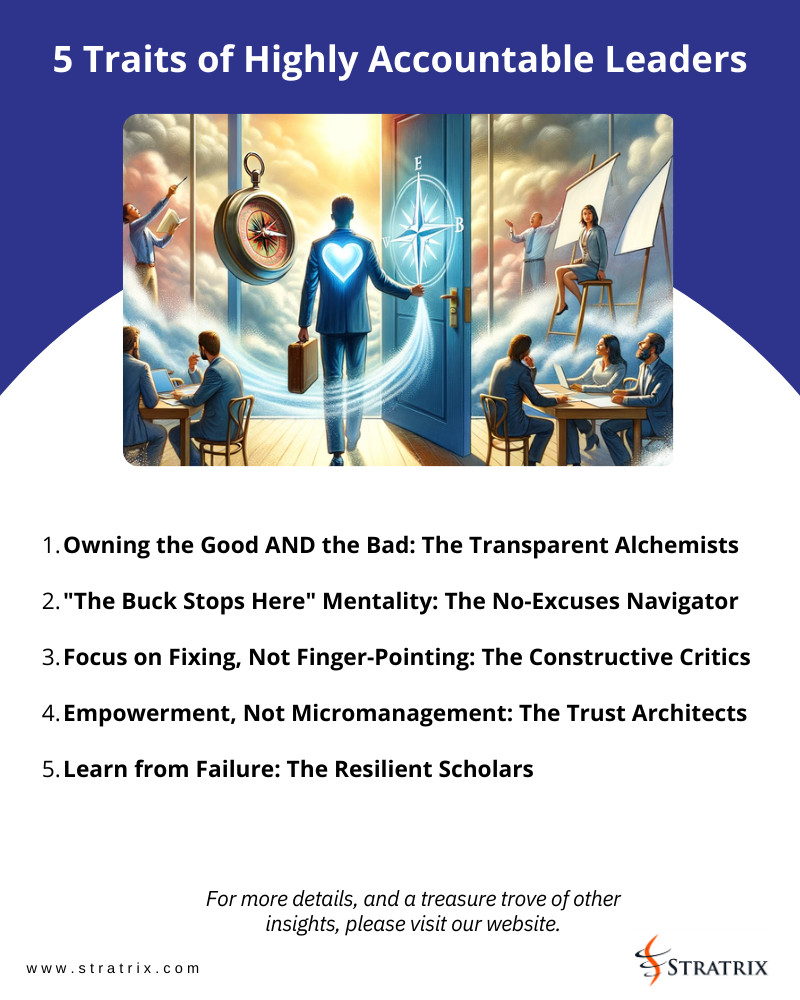In the high-stakes theatre of leadership, where every decision can tip the scales of fortune, there exists a breed of leaders who stand out not for their unblemished track records, but for their unwavering commitment to accountability. These are the leaders who, when faced with the tempests of challenge and change, choose to stand firm, own their decisions, and navigate their teams through turbulent waters with a blend of humility, integrity, and foresight. Let’s delve into the five cardinal traits that hallmark these paragons of accountability, painting their portrait with a palette of insight, empathy, and, of course, a stroke of light-hearted humor.
- Owning the Good AND the Bad: The Transparent Alchemists
Highly accountable leaders are like alchemists of transparency, turning the base metals of success and failure into the gold of trust. They understand that true leadership shines not in the spotlight of triumph but in the shadow of adversity. By owning both their wins and losses, they cultivate an environment where honesty is valued over perfection, and trust becomes the foundation upon which great teams are built. It’s a realm where “We did it” is just as important as “I messed it up,” and both are met with equal respect.
- “The Buck Stops Here” Mentality: The No-Excuses Navigator
With a compass set firmly in hand, these leaders navigate the ship of their organization with a “The Buck Stops Here” mentality. They see excuses as the fog that obscures the path to progress, choosing instead to find solutions amidst the mist. When confronted with a problem, they don’t look for the nearest scapegoat to bear the burden; they become the beacon that guides their team towards resolution. It’s this resolve to confront challenges head-on that inspires confidence and loyalty from their crew.
- Focus on Fixing, Not Finger-Pointing: The Constructive Critics
In the economy of time, blame is the currency of the inefficient. Accountable leaders know that finger-pointing is an investment with poor returns. They choose, instead, to invest their energies into finding solutions, turning obstacles into opportunities for growth and learning. This focus on constructive criticism over condemnation ensures that mistakes are not feared but welcomed as valuable lessons on the road to excellence. It’s an approach that fosters a culture of continuous improvement, where every stumble is a step towards success.
- Empowerment, Not Micromanagement: The Trust Architects
These leaders are architects of trust, building structures of empowerment rather than scaffolds of control. They understand that micromanagement is the quicksand that slows the march of progress. By entrusting their team with responsibility and autonomy, they cultivate a sense of ownership and accountability that propels productivity and innovation. It’s a testament to their belief that when you hire smart people, the best thing to do is get out of their way—after you’ve pointed them in the right direction, of course.
- Learn from Failure: The Resilient Scholars
For highly accountable leaders, failure is not a specter to be feared but a teacher to be heeded. They wear their scars as badges of honor, each one a lesson learned in the pursuit of greatness. By embracing mistakes and extracting wisdom from every misstep, they ensure that their teams are not just resilient but antifragile, thriving and growing stronger with every challenge faced. This commitment to learning from failure guarantees that their leadership, and their teams, are always evolving, always moving forward.
In the grand tapestry of leadership, highly accountable leaders stand out for their ability to weave threads of transparency, responsibility, and resilience into the fabric of their organizations. They are the ones who lead not by decree, but by example, not by asserting authority, but by earning respect. In doing so, they create workplaces that are not just productive but meaningful, where teams don’t just work—they thrive.
For all things Strategy, Management Theories, and Business Frameworks, please visit https://www.stratrix.com


